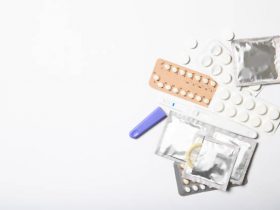The majority of birth control options are designed for women, which can create a burden on their health and budget. However, excluding condoms and vasectomies, there are several contraception options designed for men. Let’s take a closer look.

Why should male contraceptives be considered?
Our web doctors outline a few solid reasons why you should not rely upon just female contraceptives:
- The pill may not be effective every time. It is common to miss a pill, or a woman may choose not to take it due to its side effects.
- Long-acting reversible contraceptives (LARCs) like IUD, IUS and implants may be troublesome for women and can be expensive.
- Other convenient methods may become faulty.
Interested in the contraceptive pill in Ireland for women? Get in touch with our web doctors today.
Male contraception options
Research has been ongoing since the last two decades to develop convenient male contraceptive options that should be available very soon. These options include:
Contraceptive gel for men
Richard Anderson was a professor and a scientist who developed male contraceptive gel in Manchester England, 2019. The gel was formulated as a synthetic version of hormone progesterone and testosterone.
The gel (NES/T) was tried on 80 men for a year and was speculated to be more effective than male condoms. However, the conjectured results of gel are still under study.
The progestin present in gel (Nestorone®) stops the production of sperm in the testicles and reduces the levels of natural testosterone. The synthetic testosterone in the gel acts as natural testosterone and performs all its functions.
The gel is rubbed on shoulders and chest and the hormones present are absorbed through your skin into the blood stream.
Contraceptive pill for men
Male contraceptive pills have been formulated as a birth control method for men. The male pills contain progesterone and need an implant with synthetic testosterone to offset the side effects. These pills are still under trials in the United States and have shown successful results to some extent.
One such pill is 11-beta-MNDTC which is closer to the contraceptive gel. It also works by stopping sperm production and lowers the hormones responsible for sperm release. However, it also poses some side effects like acne, fatigue, headaches, erection difficulties, and decreased sex drive.
Male contraceptive injection
Male contraceptive injections have also been created by the team who invented NES/T. The idea was based on the formulation similar to gel, possessing progesterone to prevent sperm release and synthetic testosterone to balance other unwanted effects.
The results of this injection were remarkable, as only four pregnancies happened in 274 couples with male injections. But regrettably, the experiment went into the pipeline because of the side effects it produced. It was declared by researchers and male participants that side effects are severe and unbearable including acne, headaches, change in sex drive and fatigue.
RISUG and IVD
Reversible inhibition of sperms under guidance (RISUG) is a non-hormonal method of male birth control. In this method, a non-toxic chemical is injected into the vas deferens (the tube that carries the sperm out of the testes) to prevent sperm production and also kill releasing sperm. When you wish to resume sperm production, another injection is infused to counter the effects of previous chemical.
Another method is intra-vas device (IVD), which is physical plug inserted into the vas deference. It is used to block and filter the sperm release. This is also very effective method and can be easily reversed.
Things to consider
The contraceptive industry has been struggling for decades to develop a reliable male birth control method. However, research is still in progress, as the majority of male fertility control options come with numerous side effects.
Male condoms and vasectomies are not ideal options for birth control and the pull-out method is one of the least effective methods. So, couples are advised to take at least one reliable contraceptive option to avoid unwanted pregnancies.
Want to explore your options? Get expert advice with the web doctors here at Eirdoc today – your health is our priority.
Get expert advice on male contraception to understand your options with our online doctors in Dublin.
References
- What you need to know about contraception (HSE)
- Condoms-Your contraception guide (NHS UK)
- Facts and Myths about contraception
- Types of contraception and how long they take (HSE)
- Types of contraception (HSE)




